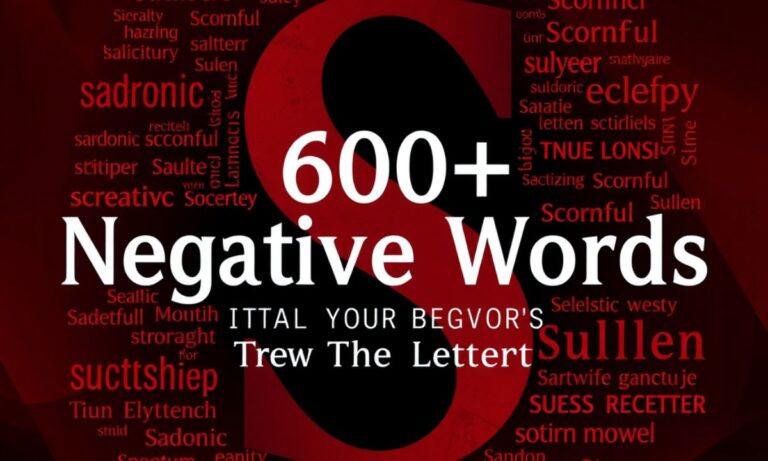The letter “S” harbors an impressive collection of 600+ negative words that paint intricate pictures of human complexity.
Language is a powerful tool for expression, and negative words can vividly capture complex emotions and experiences.
From subtle descriptors to intense characterizations, these words offer precise linguistic tools for articulating challenging human experiences and observations.
READ MORE: https://fashiongravity.co.uk/words-that-begin-with-the-letter-x/
Overview of Negative S Words
Negative words starting with “S” span multiple grammatical categories, including adjectives, nouns, adverbs, and descriptive terms.
They range from subtle emotional states like “somber” to more intense descriptions like “sinister” and “savage”.
These words provide nuanced ways to express criticism, disappointment, and complex psychological states.
Negative Words That Start With S To Describe A Person Or A Thing
Negative words describing people or things offer profound insights into character and behavior.
Terms like “sociopath”, “stubborn”, and “sneaky” provide sharp, critical descriptions of human traits.
These words help communicate complex personality characteristics efficiently. They reveal underlying behavioral patterns and psychological tendencies.
Each word carries significant descriptive power, allowing precise communication of negative perceptions.
- Sociopath
- Stupid
- Shady
- Stubborn
- Sinister
- Sneering
- Savage
- Selfish
- Snobbish
- Scornful
- Slothful
- Sneaky
- Suspicious
- Severe
- Sadistic
- Spiteful
- Scathing
- Shallow
- Scandalous
- Sordid
- Skeptical
- Sullen
- Smug
- Self-centered
- Senseless
- Sour
- Subversive
- Scheming
- Sad
- Shameful
- Seedy
- Self-absorbed
- Supercilious
- Seething
- Satanic
- Shallow-minded
- Screeching
- Strident
- Scolding
- Scared
- Stern
- Silly
- Self-indulgent
- Secluded
- Sloppy
- Soulless
- Spoiled
- Short-tempered
- Shifty
- Snide
- Stealthy
- Scattered
- Sardonic
- Snippy
- Smarmy
- Squandering
- Scratchy
- Spurious
- Snarky
- Scuzzy
- Scummy
- Snappy
- Scanty
- Scabby
- Self-contradictory
- Scrounging
- Self-conceited
- Scrappy
- Self-righteous
- Second-class
- Self-aggrandizing
- Scrawny
- Sloppiness
- Second-rate
- Self-important
- Self-destructive
- Social-climbing
- Self-serving
- Smothering
- Sluggish
- Snobbery
- Sneakiness
- Spitefulness
- Stiltedness
- Stereotyping
- Sickening
- Stagnant
- Subversive
- Superficial
- Sycophantic
- Servile
- Slippery
- Solipsistic
- Stingy
- Speculative
- Suppressive
- Squalid
- Sanctimonious
- Subservient
- Slavish
Negative Adjectives That Begin With S
Negative S adjectives provide profound descriptive capabilities for characterizing people, situations, and experiences.
Words like “sanctimonious” and “subservient” reveal complex behavioral and psychological nuances.
These adjectives help articulate subtle criticisms and observations about human nature.
They enable precise communication of negative qualities and characteristics.
- Scant
- Splintered
- Smelly
- Sick
- Stagnant
- Shabbiest
- Subordinate
- Sham
- Sanctimonious
- Scary
- Salty
- Submissive
- Stilted
- Stranded
- Sickly
- Sluggish
- Sidelined
- Sickening
- Spattered
- Straggly
- Scraggly
- Saddened
- Stale
- Snooty
- Stingy
- Sickened
- Stressful
- Sad
- Spastic
- Sole
- Seditious
- Sore
- Sarcastic
- Snoring
- Scaly
- Scorching
- Stinging
- Screaming
- Stuttering
- Squirrelly
- Shrieking
- Sassy
- Sketchy
- Scalding
- Skittish
- Stunned
- Sorry
- Stumbling
- Stubby
- Subservient
- Slimy
- Snarling
- Smoggy
- Scratched
- Scarred
- Stiff
- Strict
- Stereotyped
- Shrill
- Showy
- Soggy
- Smudged
- Spasmodic
- Sparse
- Shabbier
- Scruffy
- Subdued
- Spineless
- Slow
- Stark
- Scamp
- Sheepish
- Shabby
- Splattered
- Seedy
Negative Adverbs That Begin With S
Negative S adverbs modify actions and descriptions, adding critical layers of meaning.
Words like “sarcastically” and “selfishly” reveal underlying motivations and attitudes.
These adverbs help communicate the manner in which negative actions are performed.
They provide context and depth to descriptions of behavior.
- Sarcastically
- Selfishly
- Scandalously
- Secretively
- Shamefully
- Suspiciously
- Snidely
- Spitefully
- Sneakily
- Savagely
- Scornfully
- Sullenly
- Slyly
- Seditiously
- Sinisterly
- Sadly
- Sorrowfully
- Solemnly
- Somberly
- Suppliantly
- Submissively
- Sadly
- Scathingly
- Skeptically
- Stoically
- Sloppily
- Slowly
- Sluggishly
- Stiffly
- Stiltedly
- Spontaneously
- Sporadically
- Stammering
- Stumbling
- Stuttering
- Selfishly
- Stubbornly
- Shamelessly
- Sordidly
- Saucily
- Saucily
- Scheming
- Sedately
- Seditiously
- Sedulously
- Sickeningly
- Sadly
- Somberly
- Sullenly
- Spitefully
- Sardonically
- Sourly
- Suspiciously
- Sinisterly
- Scornfully
- Sacerdotally
- Sagaciously
- Salaciously
- Sardonically
- Satanically
- Savagely
- Scabrously
- Schematically
- Scholastically
- Scintillantly
- Searchingly
- Searingly
- Secretively
- Sedentarily
- Seductively
- Selfconsistently
- Semantically
- Semiapologetically
- Sensuously
- Separately
- Segregationally
- Seismically
- Selectively
- Self-righteously
- Semantically
- Semiologically
- Sensuously
- Sensorially
- Sentiently
- Sermonically
- Serendipitously
- Seriatim
- Sexily
- Shakily
- Shamelessly
- Sharply
- Shockingly
- Shrewdly
- Shrilly
- Sidelined
- Silently
- Sinfully
- Slyly
- Smugly
- Snappishly
- Sneeringly
- Sneakily
- Somberly
- Sourly
- Spaciously
- Sparsely
- Spasmodically
- Spitefully
- Splatteringly
- Sporadically
- Stagnantly
- Sternly
- Stiffly
- Stingily
- Stressfully
- Subserviently
- Submissively
- Subversively
- Suddenly
- Sufferingly
- Superficially
- Superciliously
- Superstiously
- Suppressively
- Surreally
- Suspiciously
- Systematically
- Sympathetically
- Synchronistically
- Synthetically
Negative S Words That Are Sad And Depressing
Sad and depressing S words explore emotional depths of human experience.
Terms like “solitude”, “sorrow”, and “suffering” capture profound emotional states.
These words help articulate complex feelings of isolation, grief, and psychological pain.
They provide linguistic tools for expressing difficult emotional experiences.
- Solitude
- Stifling
- Shame
- Silence
- Self-loathing
- Sorrow
- Suffering
- Sombre
- Self-pity
- Suppression
- Skepticism
- Seclusion
- Submission
- Surliness
- Soullessness
- Stress
- Stalemate
- Separation
- Swooning
- Squandered
- Subterfuge
- Squalor
- Submissiveness
- Stupefaction
- Swamped
- Stagnation
- Sapped
- Surrender
- Struggling
- Saturated
- Self-contempt
- Self-disparagement
- Self-disgust
- Self-hatred
- Self-reproach
- Self-criticism
- Self-blame
- Self-reprimand
- Self-reviling
- Self-punishment
- Self-censure
- Self-revulsion
- Self-condemnation
- Self-starvation
- Self-mutilation
- Self-neglect
- Self-flagellation
- Self-immolation
- Self-injury
- Self-debasement
- Self-denial
- Self-defeating
- Self-destructiveness
- Self-abuse
- Self-torment
- Self-sacrifice
- Self-isolation
- Self-obliteration
- Self-diminishing
- Self-restraint
- Self-effort
- Self-effacement
- Self-discipline
- Self-sufficiency
- Self-annihilation
- Self-reliance
- Self-control
- Self-erasure
- Self-imposed
- Selflessness
- Self-regulation
- Seclusion
- Subjugation
- Somberness
- Staleness
- Sorrowfulness
- Solemnity
- Stricken
- Satiated
- Subduedness
- Sullenness
- Suppression
- Seclusion
- Stoicism
- Stagnation
- Sadness
- Suffering
- Separation
- Surrendering
- Stalling
- Shrinking
- Subsiding
- Sinking
- Sobbing
- Succumbing
- Stifling
- Straining
- Stammering
- Sobering
- Subsiding
Unusual Negative S Words
Unusual negative S words offer unique and sophisticated ways of expressing criticism.
Words like “swasivious” demonstrate linguistic creativity in describing manipulative behaviors.
These terms provide nuanced alternatives to common negative descriptors.
They enrich vocabulary and offer precise communication methods.
- Saboteur
- Sadistic
- Sanguine (in a sarcastic context)
- Sapless
- Sardonic
- Scabrous
- Scandalous
- Scathing
- Schismatic
- Scornful
- Scrupulous (in a negative sense)
- Sedentary
- Seething
- Self-serving
- Senseless
- Sententious
- Serpentine
- Shady
- Shambolic
- Shameful
- Shattered
- Shifty
- Shrill
- Shrouded
- Sibilant
- Sinister
- Skeptical
- Sleazy
- Sluggish
- Smug
- Snafu
- Sneaky
- Snide
- Soporific
- Sour
- Spiteful
- Spurious
- Stagnant
- Standoffish
- Stealthy
- Stifling
- Stingy
- Stodgy
- Stolid
- Stormy
- Strident
- Stubborn
- Subpar
- Subversive
- Sulking
- Surly
- Suspicious
- Sweaty
- Sybaritic
- Sycophantic
- Sullen
- Sultry (in a negative context)
- Supercilious
- Superficial
- Surreptitious
- Squalid
- Squander
- Stagnation
- Strangled
- Stultifying
- Stymied
- Sardonically
- Scowling
- Scorn
- Slatternly
- Sluggishness
- Slipshod
- Smoldering
- Sorrowful
- Spasmodic
- Spite
- Spuriousness
- Stagnate
- Stifled
- Stigmatized
- Stilted
- Stinging
- Stodginess
- Strangled
- Stressful
- Strife
- Stubbornness
- Subjugation
- Suboptimal
- Subversion
- Sulfury
- Sultry
- Superfluous
- Surfeit
- Surly
- Suspect
- Sycophant
- Stale
- Stinging
- Stomped
- Strained
- Strangled
- Stunted
- Stupor
- Stygian
- Syphilitic
- Scourge
- Scour
- Scowl
- Scrimp
- Shatter
- Shirk
- Siphon
- Slay
- Slime
- Slump
- Smudge
- Snarl
- Snub
- Soggy
- Spatter
- Spite
- Splinter
- Stab
- Stagger
- Stale
- Stench
- Strain
- Stunt
- Swindle
Obscure Words That Begin With S
Obscure S words offer sophisticated linguistic options for expressing complex ideas.
Terms like “schism”, “shrewd”, and “sedentary” provide intellectual depth to communication.
These words demonstrate the richness and complexity of language.
They allow for precise and nuanced expression of abstract concepts.
- Sabatier
- Salpingitis
- Saponification
- Sardonicism
- Sanguinary
- Sapiosexual
- Saponaceous
- Satrap
- Scabrous
- Scintilla
- Scopophobia
- Selenography
- Semantics
- Senescence
- Septentrional
- Serendipity
- Sesquipedalian
- Sibilance
- Simulacrum
- Sinistrorse
- Sistrum
- Skulduggery
- Sleight
- Soporific
- Sororal
- Sphygmomanometer
- Spoliation
- Spurious
- Stalactite
- Stalwart
- Stentorian
- Stochastic
- Stygian
- Subcutaneous
- Subservient
- Sulphurous
- Supercilious
- Surreptitious
- Susurrus
- Sybarite
- Synecdoche
- Sycophant
- Sylph
- Symbiosis
- Synesthesia
- Syzygy
- Saponify
- Salubrious
- Sanguineous
- Sanctimony
- Saprogenic
- Saturation
- Scapegrace
- Sclerosis
- Scopophilia
- Sedulous
- Semiquaver
- Senility
- Septuagenarian
- Serpentine
- Sesquipedal
- Sibilant
- Similitude
- Sinapistic
- Sinciput
- Sinecure
- Sinistral
- Sistrum
- Skeptical
- Slough
- Solipsism
- Somnolent
- Sorcery
- Spatulate
- Specious
- Spectral
- Spoliator
- Spuriousness
- Stalwartly
- Stentorianly
- Stipulate
- Strabismus
- Stringent
- Subjugate
- Sublimation
- Subordinate
- Subtlety
- Sulfide
- Sulfurous
- Superlative
- Surrogate
- Susceptible
- Swindle
- Synergistic
- Syphilis
- Synaptic
- Systematic
- Synchronicity
- Synthesis
- Syntactic
FAQ’s
What makes these negative S words unique?
Precise linguistic representation of complex human experiences.
How can these words be effectively used?
In writing, communication, and understanding psychological nuances.
Are all these words commonly used?
Some are common, while others are more specialized or obscure.
Can negative words be constructive?
They can help understand and articulate challenging experiences.
How do these words impact communication?
They provide depth, precision, and emotional intelligence to expression.
Conclusion
Negative words starting with “S” reveal the extraordinary complexity of human experience.
They provide linguistic tools for expressing subtle emotional states, critical observations, and profound psychological insights.
This comprehensive exploration demonstrates language’s power to capture nuanced human experiences.

I’m Irfan, an experienced SEO content and SEO specialist with 2 years of expertise, currently contributing to Al Jazeera News Website.





